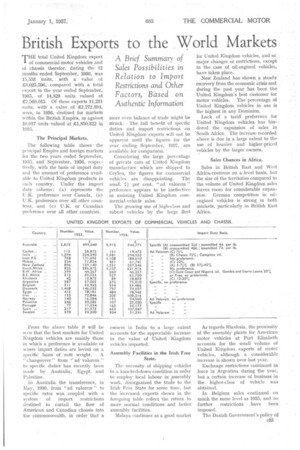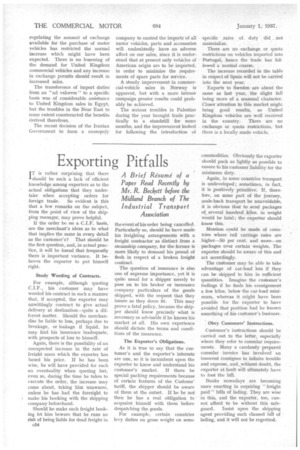British Exports to the World Markets
Page 103

Page 104

If you've noticed an error in this article please click here to report it so we can fix it.
THE total United Kingdom export I of commercial-motor vehicles and of chassis therefor, during the 12 months ended Septembei, 1936, was 15,553 units, , with a value of £3,025,596, compared with a total export in the year ended Septembei-, 1935, of 14,829 -units valued at £2,560,015. Of these exports 11,231 units, with a value of £2,272,391. were, in 1936, destined for markets within the British Empire, as against 10,017 units valued at i£1,850,322 in 1035.
• The Principal Markets.
The, following table shows the principal Empire and foreign markets for the two years ended September, 1935, and September, 1936, respectively, with the basis of import duty and the amount of preference available to United Kingdom products in each country. Under the import duty column : (A) represents the U.K. preference over Canada, (E) U.K. preference over all other countries, and (c) U.K. or Canadian preference over all other countries.
From the above table it will be seen that the best markets for United Kingdom vehicles are mainly those in which a preference is available or where import duties are levied on a specific basis of nett weight. A " changeover " from "ad valorem" to specific duties has recently been made by Australia, Egypt and Palestine.
In Australia the transference, in May, 1936, from "ad valorem" to specific rates was coupled with a system of import restrictions destined to curtail the flow of American and Canadian chassis into the commonwealth, in order that a more even balance of trade might be struck. The full benefit of specific duties and import restrictions on United Kingdom exports will not be apparent until the figures for the year ending September, 1937, are available for comparison.
Considering the large percentage of private cars of United Kingdom manufacture which are shipped to Ceylon, the figures for commercial vehicles are disappointing. The small 7i per cent. "ad valorem" preference appears to be ineffective in assisting United Kingdom commercial-vehicle sales.
The growing use of high-class and robust vehicles by the large fleet owners in India to a large extent accounts for the appreciable increase in the value of United Kingdom vehicles imported.
Assembly Facilities in the Irish Free
State.
The necessity of shipping vehicles in a knocked-down condition in order to employ local labour in .assembly work, disorganized the trade to the Irish Free State for some time, but the increased exports shown in the foregoing table reflect the return to more normal conditions and better assembly facilities.
Malaya continues as a good market for United Kingdom vehicles, and nc major changes or restrictions, except in the case of oil-engined vehicles, have taken place.
New Zealand has shown a steady recovery from the economic crisis and during the past year has been theUnited Kingdom's best customer for motor vehicles. The percentage of United Kingdom, vehicles in use is the highest in any Dominion.
Lack of a tariff preferenceUnited Kingdom vehicles has in.clered the expansion of sales , in South Africa. The increase recorded above is due in a large extent to the use of hexiiier and higher-priced vehicles by the larger owners.
Sales Chances in Africa.
Sales in British East and West Africa. continue on a level basis, but the size of the territories compared to the volume of United Kingdom sales leaves room for considerable expansion. German competition in oilengined vehicles is strong in both markets, particularly in British East Africa.
As regards Rhodesia, the proximity of the assembly plants for American motor vehicles at Port Elizabeth accounts for the small volume of United Kingdom exports of motor vehicles, although a considerable increase is shown over last year.
Exchange restrictions continued in force in Argentina during the year, but a certain increase of business in the higher-class of vehicle was obtained.
In Belgium sales -continued on much the same level as 193;5, and no further restrictions have been • imposed.
The Danish Government's policy of regulating the amount of exchange available for the purchase of motor vehicles has restricted the normal increase which might have been expected. There is no lessening of the demand for United Kingdom commercial vehicles and any increase in exchange permits should result in increased sales.
The transference of import duties from an " ad valorem" to a specific basis was of considerable assistance to United Kingdom sales in Egypt, but the troubles in the Near East to some extent counteracted the benefits derived therefrom.
The recent decision of the Iranian Government to form a monopoly company to control the imports of all motor vehicles, parts and accessories will undoubtedly have an adverse affect on our sales, since it is understood that at present only vehicles of American origin are to be imported, in order to minimize the requirements of spare parts for service.
A steady improvement in commercial-vehicle sales in Norway is apparent, but with a more intense campaign greater results could probably be achieved.
The serious troubles in Palestine during the year brought trade practically to a standstill for some months, and the improvement looked for following the introduction of specific rates of duty did _ not materialize.
There are no . exchange or quota restrictions on vehicles imported into Portugal, hence the trade has followed a normal course.
The increase recorded in the table in respect of Spain will not be carried into the next year.
Exports to Sweden are about the same as last year, the slight fall being more of a seasonal character. Closer attention to this market might bring good results, as United Kingdom vehicles are well received in the country. There are no exchange or quota restrictions, but there is a locally made vehicle.




























































































































































